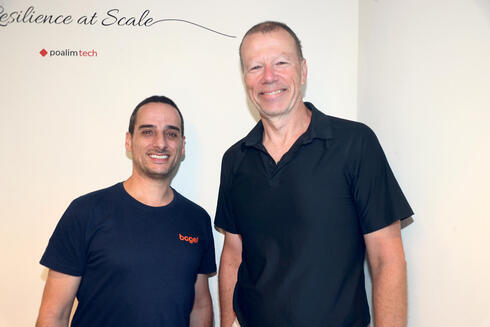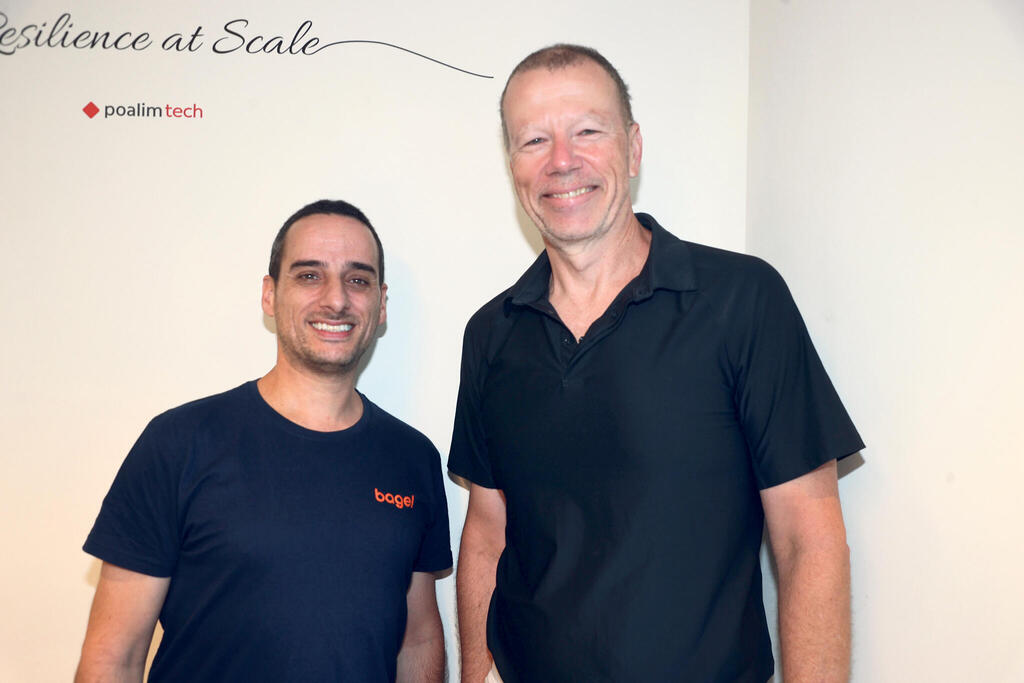
"Challenging times truly bring out the good companies that are doing something real"
As part of Calcalist and Poalim Tech’s Growth+ initiative which connects experienced entrepreneurs with early stage startups, Gong CEO Amit Bendov and Bagel CEO Ohad Biron have been meeting and sat down with Calcalist to discuss what they’ve learned from each other
Amit Bendov, CEO and Co-Founder of Gong, which developed a business intelligence platform for salespeople leveraging AI to enhance sales team capabilities, met with Ohad Biran, CEO of Bagel, an AI platform that analyzes customer opportunities and product needs to maximize company growth and revenue. The conversation took place as part of Calcalist and Poalim Tech’s Growth+ project to strengthen the resilience of the high-tech industry in Israel. This initiative includes a series of one-on-one meetings between experienced entrepreneurs and early-stage startups aimed at providing advice, support, and knowledge on entrepreneurship and creativity, managing startups, and building companies for growth.
Michal Kissos Hertzog, CEO of Poalim Tech, said about the project: "In conversations with entrepreneurs, we talk about foresight, developing the ability to understand in advance where we want to be in the future. From there, there are discussions on how to learn from mistakes we haven’t yet made and what lessons we can learn from the future. Developing such an ability to look forward allows entrepreneurs to chart their startup’s path and manage difficult and challenging scenarios."
Amit, tell us about a crisis you encountered early on and what you learned that could help young entrepreneurs.
"When we started, we sold to the wrong person in the organization. Initially, I did the sales myself. I sat at a WeWork and made calls and I outsourced someone to set up meetings for me and would call operations managers from different organizations. They always told me at the end of the call that it sounded very cool but they had other projects and to speak again in a few weeks. After more than 40 such calls, we decided to move up in the organization, to the VPs, and that’s when things started to move. Since we also had technology that understands sales, we didn’t waste too much time, but there are companies that get stuck at this point for a year and fail to raise money."
Ohad, what was the biggest challenge you faced in the past year?
"The war, on one hand, created motivation for employees to prove that we could do it. On the other hand, as a startup, our first customers are here in the country and this was difficult. There were two to three months where there was no one to talk to. We thought about what we were doing and how to maintain momentum and generate leads, and it pushed us to go more into Europe and the U.S. - to customers who weren’t dependent on this ecosystem. But that’s not something that can be done instantly; it was a process that required adapting our go-to-market strategy until things recovered here."
Amit, what advice did you give on this issue?
"Hard times toughen you if they aren’t too hard. Adversity clarifies what’s important to embrace and helps you to make the right choices. Challenging times truly bring out the good companies that are doing something real."
What did you learn from each other?
Ohad: "We talked about market penetration strategy in the U.S., sales, how to fine-tune our messages to different buyer personas - those who ultimately make the decision and write the check, not just those who use the product or connect me to the organization. This can be a serious game-changer."
Amit: "I learned about very interesting technology and people who are solving a real problem. It reminded me of my early days at WeWork when I would go down to the grocery store to buy supplies for the company."
Tell us something interesting or surprising you learned about each other.
Ohad: "I learned from Amit that he is still on the move. He defines himself as living both in Israel and the U.S. I thought that was something that happens only in the beginning, but it turns out it’s not."
Amit: "For six years until Covid, Ohad lived in France, where he completed an MBA and worked at a startup connected to Mobileye."














